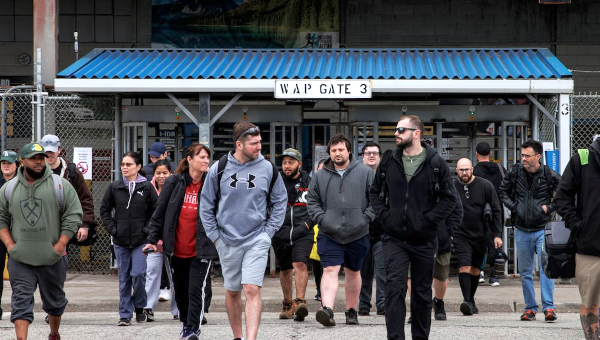Canada’s Latest Political Prisoners
On March 18, 2008, the Ontario Superior Court’s Judge Patrick Smith sentenced Chief Donny Morris and six other council members from the Kitchenuhmaykoosib Inninuwug (or KI) First Nation, a community of about 1200 people in northern Ontario, Canada, to six months in jail for ‘contempt of court.’ They defied a court order to stay away from a part of their lands, slated for mining by the Platinex Corporation. They were also fined an exorbitant sum, but the judge applied the jail terms because he knew that they could not pay – they were already bankrupt because of the $500,000 in court fees they had paid trying to defend themselves from Platinex before the court, over the past several years. Platinex had sued KI, at first for $10-billion (before reducing it to $10-million).
In his sentence, Judge Smith cited as a precedent the jailing of Ardoch Algonquin Nation leader, Bob Lovelace, who had been sentenced to his own six months on February 15 for trying to stop uranium mining by the mining company Frontenac Ventures on their lands, about 100km from Canada’s capital, Ottawa (for a map of the area and some discussion of the legal aspects see the Ardoch Algonquin First Nation’s website at: www.aafna.ca and specifically www.aafna.ca/Uranium_mining.html). Lovelace was also ordered to pay $25,000. Paula Sherman, the Nation’s chief, was ordered to pay $15,000 and the community an additional $10,000, plus $2000 a day for non-compliance. The judge in this case, J. Cunningham, said that he found the sentencing an “unpleasant task.”
The jailing of these leaders offers a window into a whole host of Canada’s irrationalities and cruelties – the callous dispossession of the indigenous, the search for quick profits to be torn out of the ground and turned into money whatever the consequences, the energy system based on unsustainable premises, the heartlessness in defence of an indefensible system.
The story in Canada is an old one, described eloquently in a 25-year old book that could have been written yesterday by Robert Davis and Mark Zannis (1983) called “The Genocide Machine in Canada.” Indigenous nations are deprived of their landbases and surrounded by settlers, extractive industries, or developments. They lose their means of survival when their lands are taken or when their lands are poisoned. They are dependent on small payments from the government. When they resist further encroachments on their lands, these sources of income are threatened. If that doesn’t scare them, there’s always violence and jail terms.
To understand the significance of the jailings, it is necessary to take a moment to explain Canada’s laws on indigenous rights and public land use.
Legal trickery
KI falls under “Treaty 9,” which was signed in 1929. The legal dispute is that Platinex claims it has a right to explore and exploit under Ontario’s mining laws and tried to do so in 2005-6. Do the rights of mining companies to profit, based on provincial jurisdiction, trump agreements between the federal government and indigenous nations in an effort to protect the nations’ means of survival? These means, to be clear, are good hunting, gathering, and fishing lands on Big Trout Lake in some good natural forest that will be destroyed by mining operations. KI argued that the drilling would do irreparable harm. Platinex argued that they were losing money. The Ontario court went with Platinex.
Ontario’s Mining Act is 135 years old and based on a wild-west model. It allows anyone to stake a claim anywhere on Crown land. This means that public land can be exploited for profit by private interests. The legal issue is whether this law supercedes all others – as well as any ethical or common sense that anyone might apply to the situation. KI and others have claimed that the Mining Act is unconstitutional, bypassing as it does the ‘duty to consult’. The court claimed that if these leaders weren’t jailed, there would be a loss of respect for the law, the creation of two regimes of justice. But there are two regimes of justice already. Those who illegally take or pollute indigenous territories are not punished with jail terms, the way Bob Lovelace and these other leaders have been. The Shabot Obaajiwan’s spokesperson Earl Badour put it succinctly in a press relese of March 18. ”The government accuses First Nations of breaking Canadian laws when they defend their lands, but Canada itself is selective about which of its own laws it will abide by,” said Badour. “If the law doesn’t serve their purposes they conveniently ignore it.” The Shabot Obaajiwan is suing the mining companies and the government based on the ‘duty to consult’ in Supreme Court rulings and the constitution. The duty to consult means that indigenous communities must be meaningfully consulted on resource exploration on their lands. This of course clashes with Ontario’s Mining Act, which is based on corporations grabbing whatever they can. The concern for the rule of law that was Judge Smith’s justification for the draconian sentences is a concern for the Mining Act above the constitution and Supreme Court decisions. Higher laws have been circumvented through for the sake of profit.
Other legal trickery included the company getting a court order and an injunction rather than filing trespass charges against the indigenous – the trespass charge would have opened up all the legal questions about whose land it was.
Mining Politics
The company trying to get the uranium at the expense of the Ardoch Algonquin community, Frontenac Ventures, is shrouded in mystery. Mining researcher Jamie Kneen told IPS’s Chris Arsenault that “aside from the president and their lawyer, no one knows who they are or where they get their money.” Frontenac’s president George White refused to answer media calls.
The lawyer for Frontenac, Neil Smitheman, is also representing Platinex. Indeed, when the provincial court in 2006 ruled that Platinex had to stop its operations while consultations were held with KI, Smitheman said “There are numerous mining companies and exploration companies that could be in a similar situation if there’s a failure to have proper consultation on lands that could be subject to a claim by first nations people.” Apparently the court came to the same conclusion, deciding in 2007 that Platinex could in fact drill on KI’s territories.
For a sense of what KI’s territories face if uranium mining does take place, there is precedent. Canada’s most famous uranium mine was the Elliot Lake mine, also in northern Ontario, that left 130 million tons of tailings and destroyed the Serpent Lake ecosystem while helping the nuclear weapons buildup of the 1950s and 1960s (see Mining Watch’s page on Elliot Lake).
There are no non-toxic industrial mining methods (and certainly if there are they haven’t been discovered by Canadian mining companies), so people could be forgiven for asking whether it would be so bad to leave the stuff in the ground. Uranium after all is a material that is radioactive and poisonous and which, once used, is hazardous for thousands of years. In the words of Doreen Davis, another Algonquin leader who was sentenced to jail, “Uranium mining has no record other than environmental destruction and negative health issues”. Uranium is a part of Ontario’s current energy mix. Nuclear power is being presented as a solution to climate change and the oil running out. But nuclear power, like ethanol, is a false solution. Ethanol offers a way to take huge amounts of agricultural land out of circulation so that societies can feed cars and starve people. Uranium offers a way to trade the dangers of climate change in for the dangers of radioactive poisoning and potential nuclear catastrophe. But in both cases, the rising prices are making it economically viable to further dispossess and destroy communities – in Latin America for ethanol, and in Canada for uranium.
Paul McKay, a friend and neighbour of Lovelace’s, made some other points about the mining in an op-ed in the Kingston Whig-Standard: “As even the mine promoter’s lawyer has admitted in court hearings, there is a vanishingly small chance a uranium mine will ever get built at the headwaters of the Mississippi River northwest of Sharbot Lake. Compared to other deposits in Saskatchewan, Australia, South Africa and Asia, the ore is laughably low-grade, and the cost to mine fatally high.” So, too, McKay argues, recalling the Elliot Lake mines, would the pollution risk of trying to extract this low-grade uranium from these deposits.
The point of these jailings, McKay argues, is a two-fold political message. One, to the mining companies – the mineral wealth of the north is open to access and the government will clear any indigenous resistance out of the way. These include giants like the De Beers diamond company, which is operating in the north around the James Bay. Two, to the indigenous – that any resistance against the latest bonanza of extraction and destruction will be met with criminalization and brutal penalties. McKay also suggests that these mining companies might be looking, not for platinum or uranium, but for a government payoff “if the Ontario government effectively pays it to go away. If this occurs, then it will be Ontario taxpayers who end up being mined for millions. not uranium or platinum deposits.”
This, too, has a recent Ontario precedent – the Douglas Creek Estates on Six Nations Territory (I wrote about this for ZNet in 2006). In that case as well, the Ontario government is attempting the tactic of paying a massive amount of taxpayers’ money to a corporation to “go away.” In addition to benefiting speculators, it has the added propaganda benefit of making indigenous claims seem prohibitively expensive and “impractical” (the practicalities of endlessly expanding suburban subdivisions and toxic uranium and platinum mines having been accepted as a given).
Governmental games and the indigenous response
When indigenous people from affected communities lit a symbolic, sacred fire in support of the jailed in Thunder Bay, a town of 100,000 people about 600km from the KI First Nation, in support of the jailed, city police and fire marshals extinguished it – itself an ugly and symbolic gesture.
As in other cases (see my article on Shawn Brant for example), the government’s actions are narrowing options down to make resistance the only option for indigenous communities. A March 20 press release from First Nations of Sachigo Lake, Bearskin Lake, Muskrat Dam, Kasabonika, Wunnimun, Wapekeka, Kingfisher and Wawakapewin called for sustained opposition to the court’s decision and the mining companies stance. A group of Chiefs from the western Canadian province of British Columbia suggested the AFN (Assembly of First Nations) tear up its Memorandum of Understanding (MoU) with the Prospectors and Developers Association of Canada (PDAC), signed on March 4, 2008. “The community members have been jailed for protecting their Title and Rights to their territories and any continued relationship with the mining industry will be indelibly stained by these shocking events… Given the ugly, thuggish approach demonstrated thus far by the Courts and by the mining industry, it is of the utmost importance to show our support of the Kitchenuhmaykoosib Inninuwug First Nation and refuse to have any relationship with the mining industry.” The Nishnawbe Aski Nation (NAN) suspended mining-related negotiations with the Ontario government the day after the KI leaders were sentenced. “It was a real insult to all first nations,” Alvin Fiddler, Deputy Grand Chief of NAN, told reporters on March 19. AFN National Chief Phil Fontaine visited some of the jailed leaders in Thunder Bay on March 22 and called the jailings an obstacle to peace. Canada’s Anglican primate, Archbishop Fred Hiltz, wrote a letter to Ontario’s premier saying the jailing arises “out of the continual imposition of the power and values of colonizers.”
The Grand Chief of NAN, Stan Beardy, was quoted in the Kingston Whig-Standard arguing that other political considerations were at work. “The McGuinty government got labelled weak in dealing with Caledonia, and now they say, ‘We’re not weak and we’ll show you by throwing these Indians in jail…’ What is happening here is we’ve been criminalized for practising our way of living. The government wants to make an example of us. What’s being done is, once more, we’re being moved out of the way, our valuable resources are being exploited and everybody is benefiting except us.”
The federal government has been silent, and by its silence, leaving the issue to the province, has sent a message that indigenous issues are not national issues at all. Given the views of the Harper regime on indigenous rights, however – prominent Harper adviser, the University of Calgary’s Thomas Flanagan, has argued in his book “First Nations? Second Thoughts,” that “European civilization was several thousand years more advanced than the aboriginal cultures of North America” and that “the European colonization of North America was inevitable, and, if we accept the philosophical analysis of John Locke and Emer de Vattel, justifiable” – it is probably better that the Harper people not be involved. As for the provincial government, they are using familiar tactics. While the Superior Court imposes draconian sentences, the provincial government’s Aboriginal Affairs minister Michael Bryant offers a ‘compromise’ – in which the leaders don’t go to jail, pay only some of the fines, and allow the mining to continue. In other words, surrender. And despite having tried very hard to prevent jail sentences, Bryant says, he’s not willing to give up (presumably on trying to get the indigenous to give up).
But the government and the mining companies are asking too much. As they do in other parts of the world, mining transnationals try to isolate the communities that are affected. They want the indigenous to consent to the destruction of the small amount of land that has been left to them, in order that some companies can make money extracting toxic metals. If consent is not forthcoming, government officials will use force. But to use force, they’ll still have to convince Canadians that it’s worth destroying other people’s lands and livelihoods for uranium, platinum, diamonds, or money. They are betting on Canadians being ignorant, or indecent. •
Please take a moment today to send a letter
to Ontario Premier Dalton McGuinty.
The Maquila Solidarity Network has a long-standing relationship with the leadership of
KI First Nation, who have lent support to MSN’s campaigns over the years. Although this urgent action alert is not specifically related to labour or women’s rights in the apparel and footwear industries, we hope our network will lend their support to the leadership and citizens of the KI First Nation as they confront corporations and governments that have failed to respect their rights.
On March 17, 2008, an Ontario Superior Court judge sentenced six Aboriginal protesters to six months of jail for peacefully defying a court order that would allow Platinex, a mining exploration company, to drill for minerals on their traditional lands in Northern Ontario, Canada. The Kitchenuhmaykoosib Inninuwug (KI) First Nation fears that mining activity will jeopardize hunting and burial grounds and argues that the Ontario government awarded the mining permits without consulting and accommodating their people, a violation of aboriginal rights and Canadian law.
The individuals jailed include the Chief and four Councilors of the (KI) First Nation. One of them, a woman, is separately incarcerated at the Thunder Bay District jail.
KI First Nation continues to recognize its Chief and Councilors as leaders in exile and as prisoners of conscience. It has also declared that a 2001 community declared moratorium on exploration and development will continue to be enforced in KI traditional territory, pending resolution of a treaty land entitlement claim and fulfillment of the Government of Ontario’s legal obligation to consult and accommodate.
For more information and to monitor developments, check out:
intercontinentalcry.org and
kitchenuhmaykoosib.com
Take action NOW!
- Write today to the Premier of Ontario, demanding the release of the jailed First Nation Chief and Councilors and a halt to mining exploration in KI First Nation lands. Please cc Lynda Yanz at MSN so that we can pass on copies of your letters to KI First Nation leaders: lyanz@maquilasolidarity.org. You’ll find a sample letter at the end of this e-mail.
- You can also write letters of support to the jailed leaders.
Here are the names and addresses where you can send individual letters of solidarity and encouragement.
Chief Donny Morris, Deputy Chief Jack McKay, Councillor Samuel McKay, Councillor Darryl Sainnawap, Bruce Sakakeep, Lands & Environment Director:
C/O Thunder Bay Correctional Centre, Highway 61 South, PO Box 1900, Thunder Bay ON, P7C 4Y4Head Councillor Cecilia Begg, is being held separately at Thunder Bay District Jail:
Cecilia Begg, C/O Thunder Bay District Jail, 285 McDougall St S, Thunder Bay, ON P7A 2K6
Sample Letter to Dalton McGuinty, Premer of Ontario
E-mail to: dmcguinty.mpp.co@liberal.ola.org
Cc: lyanz@maquilasolidarity.org
Dalton McGuinty, Premier of Ontario Legislative Building Queen's Park Toronto ON M7A 1A1 Dear Premier McGuinty; I am writing regarding the incarceration of Kitchenuhmaykoosib Inninuwug (KI) First Nation Chief Donny Morris, Council members Samuel McKay, Jack McKay, Darryl Sainnawap Cecilia Begg, and community member Bruce Sakakeep. They have recently been convicted of civil contempt charges and jailed for 6 months for peacefully opposing mineral exploration on their traditional territory. I understand that Ontario continues to grant exploration permits to mining companies without fulfilling its legal obligation to consult with and accommodate Aboriginal peoples. It is disgraceful that these six people are serving time for upholding their community's rights while Ontario continues to flout the law. I ask that the Province change its antiquated Mining Act to ensure real consultation and accommodation of aboriginal rights before granting mineral leases. I also ask that the Ontario Government take action to release the six KI First Nation prisoners of conscience currently being punished for protecting their lands and community. Sincerely, [Your signature]





